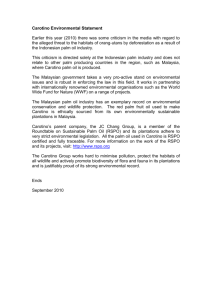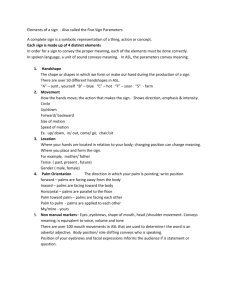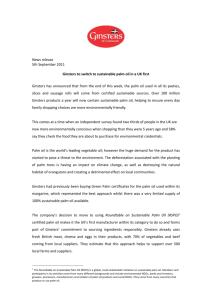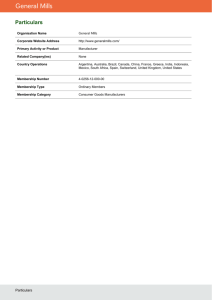General Mills - Roundtable on Sustainable Palm Oil
advertisement
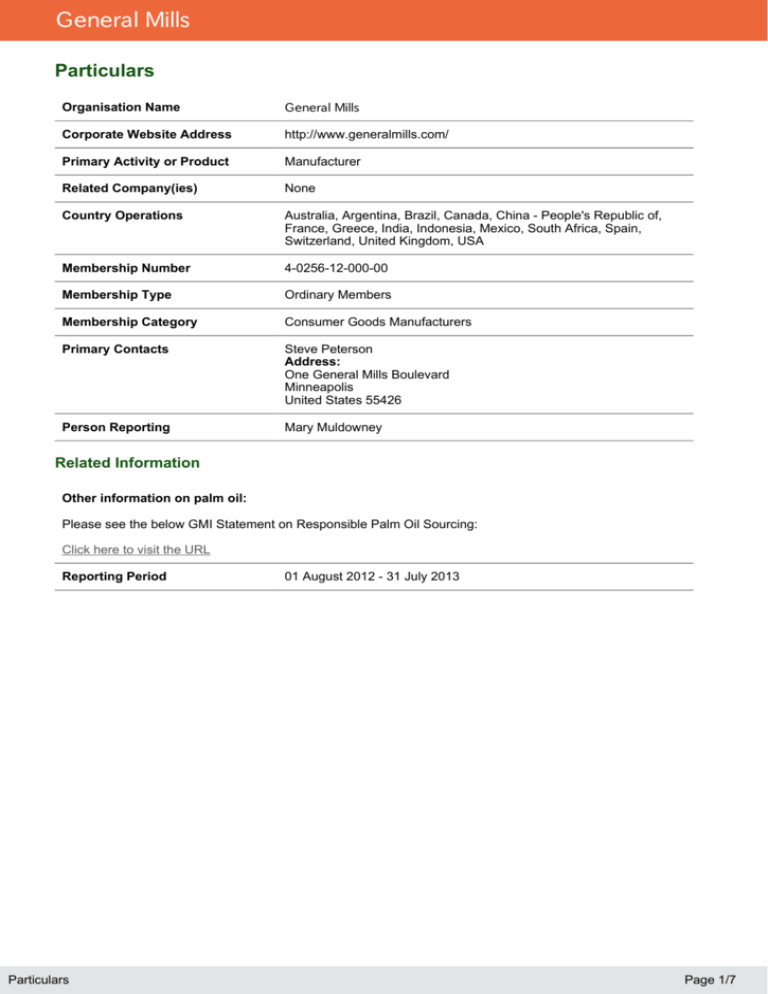
General Mills Particulars Organisation Name General Mills Corporate Website Address http://www.generalmills.com/ Primary Activity or Product Manufacturer Related Company(ies) None Country Operations Australia, Argentina, Brazil, Canada, China - People's Republic of, France, Greece, India, Indonesia, Mexico, South Africa, Spain, Switzerland, United Kingdom, USA Membership Number 4-0256-12-000-00 Membership Type Ordinary Members Membership Category Consumer Goods Manufacturers Primary Contacts Steve Peterson Address: One General Mills Boulevard Minneapolis United States 55426 Person Reporting Mary Muldowney Related Information Other information on palm oil: Please see the below GMI Statement on Responsible Palm Oil Sourcing: Click here to visit the URL Reporting Period Particulars 01 August 2012 - 31 July 2013 Page 1/7 ACOP 2012/2013 - General Mills Consumer Goods Manufacturers Operational Profile 1. Main activities within manufacturing ■ End-product manufacturer Operations and Certification Progress 2. Do you have a system for calculating how much palm oil and palm oil products you use? Yes Total volume of all palm oil products used in the year in your own brand products: -3.1. Total volume of Crude Palm Oil used in the year: -3.2. Total volume of Palm Kernel Oil used in the year: -3.3. Total volume of other Palm Oil Derivatives and Fractions used in the year: 56041 3.4. Total volume of all palm oil and palm oil derived products you used in the year: 56041 4. Volume of Crude Palm Oil used in the year in your own brand products that is RSPO-certified -4.1. Book & Claim -4.2. Mass Balance -4.3. Segregrated -4.4. Identity Preserved -4.5. Total volume of Crude Palm Oil used that is RSPO-certified: -- Consumer Goods Manufacturers Page 2/7 ACOP 2012/2013 - General Mills 5. Volume of Palm Kernel Oil used in the year in your own brand products that is RSPO-certified: -5.1. Book & Claim -5.2. Mass Balance -5.3. Segregrated -5.4. Identity Preserved -5.5. Total volume of Palm Kernel Oil handled that is RSPO-certified: -6. Volume of all other palm-based derivatives and fractions used in the year in your own brand products that is RSPO-certified: -6.1. Book & Claim -6.2. Mass Balance 25772 6.3. Segregrated -6.4. Identity Preserved -6.5. Total volume of palm-based derivatives and fractions used that is RSPO-certified: 25772 7. What type of products do you use CSPO for? Food products 8. Do you ask your suppliers if the palm oil supplied comes from growers who disclose their GHG emissions within the RSPO P&C 5.6 & 7.8? No Suppliers report that palm oil supplied comes from growers who disclose their GHG emissions within the RSPO P&C 5.6 & 7.8 -- Consumer Goods Manufacturers Page 3/7 ACOP 2012/2013 - General Mills Time-Bound Plan 9. Date expected to/or started to use any RSPO certified oil palm products – own brand 2012 10. Date expected to be using 100% RSPO certified oil palm products from any supply chain option– own brand 2015 11. Date expected to be using 100% RSPO certified oil palm from physical supply chains (Identity Preserved, Segregated and/or Mass Balance) - own brand products 2015 12. Do your (own brand) commitments cover your companies' global use of palm oil? Yes 13. Does your company use palm oil in products you manufacture on behalf of other companies? Yes 14. Date expected to actively communicate to promote the use of certified sustainable palm oil in other manufacturers’ brands that you sell. 2015 15. Which countries that your organization operates in do the above commitments cover? Australia, Argentina, Brazil, Canada, China - People's Republic of, France, Greece, India, Indonesia, Mexico, South Africa, Spain, United Kingdom, USA 16. What are your interim milestones towards achieving RSPO certification commitment to your own-brands (year and progressive CSPO%) - please state annual targets/strategies. End of July 2013 at 46%; End of GMI Fiscal year 2014 at 75%; End of calendar year 2015 at 100%. Actions for Next Reporting Period 17. Outline actions that will be taken in the coming year to promote sustainable palm oil. GMI will publish our progress on moving to CSPO in our Global Responsibility Report. Please see the 2013 GMI Global Responsibility Report at the following website: Click here to visit the URL We will also supplement physical purchases with Green Palm certificates if needed. GMI is in the process of completing Green Palm application. 18. Do you publicly report the GHG emissions of your operations? Yes Public report of GHG emissions on operations M-GHG-Emissions-Report.pdf For administration purpose, attachment files are renamed automatically Consumer Goods Manufacturers Page 4/7 ACOP 2012/2013 - General Mills Reasons for Non-Disclosure of Information 19. If you have not disclosed any of the above information, please indicate the reasons why Other - Other reason: Proprietary Trademark Related 20. Do you use or plan to use the RSPO trademark on any of your products? No If yes, when will you start? -21. Do you undertake or support any other projects related to sustainable palm oil that have not been captured in this report? Yes Application of Principles & Criteria for all members sectors 22. Related to your sourcing, do you have (a) policy/ies, that are in line with the RSPO P&C? Water, land, energy and carbon footprints Land Use Rights ■ Ethical conduct and human rights ■ Labour rights ■ Stakeholder engagement ■ ■ - Water, land, energy and carbon footprints policy M-Policies-to-PNC-waterland.pdf For administration purpose, attachment files are renamed automatically - Land use rights policy M-Policies-to-PNC-landuseright.pdf For administration purpose, attachment files are renamed automatically - Ethical conduct and human rights policy M-Policies-to-PNC-ethicalconducthr.pdf For administration purpose, attachment files are renamed automatically - Labour rights policy M-Policies-to-PNC-laborrights.pdf For administration purpose, attachment files are renamed automatically - Stakeholder engagement policy M-Policies-to-PNC-stakeholderengagement.pdf For administration purpose, attachment files are renamed automatically Consumer Goods Manufacturers Page 5/7 ACOP 2012/2013 - General Mills 23. What steps will your organization take to minimize its resource footprints? Our sustainability mission at General Mills is to conserve and protect the natural resources upon which our business depends. We focus our efforts on areas where we can have the greatest impact, both within our own operations and outside of them, primarily in agriculture and ingredient production. See link here for more information: Click here to visit the URL 24. What steps will your organization take to realize ethical conduct using business-applicable regulations and industry practices? As part of our commitment to supporting human rights in our supply chain, we are leaders in the AIM-PROGRESS Responsible Sourcing task force, whose mission is to promote responsible sourcing by sharing best practices and promoting efficiency in the packaged goods supply chain. We also are signatories to the United Nations Global Compact (UNGC) and are guided by the International Labour Organization’s (ILO) 1998 Declaration on Fundamental Principles and Rights at Work. Our Supplier Code of Conduct details our expectations of our suppliers. Together, our Workplace Standards and Ethical Sourcing Policy and our Supplier Code of Conduct set standards for our company, as well as for our suppliers, vendors and other business partners, regarding the protection of human rights. These standards are based in part on the ILO 1998 Declaration on Fundamental Principles and Rights at Work. See page 53 in our 2013 Global Responsibility Report for more information. Link here: Click here to visit the URL 25. Has your company supported any community programmes on its own or through partnerships? How do you benchmark the impacts of these programmes? General Mills supports World Wildlife Fund in their efforts to help Independent Smallholders achieve RSPO certification in Indonesia. 26. Are you sourcing 100% physical CSPO? No 26.1. Please details your organization’s plan to cover sourced palm oil and palm kernel oil, which is not yet segregated or identity preserved, through Mass Balance. If you have not committed to sourcing 100% of palm products under the Mass Balance supply chain system until the goal of 100% segregated or identity preserved CSPO can be achieved, please explain why. -- Consumer Goods Manufacturers Page 6/7 ACOP 2012/2013 - General Mills Challenges 1. Significant economic, social or environmental obstacles Small quantity of purchases and availability of certain palm fractions. 2. How would you qualify RSPO standards as compared to other parallel standards? -Cost Effective: Yes Robust: Yes Simpler to Comply to: Yes 3. How has your organization supported the vision of RSPO to transform markets? General Mills continues to work with stakeholders to make progress towards more sustainable palm production, including NGO’s, industry groups, and other interested parties on this and other sustainability topics. Challenges Page 7/7
